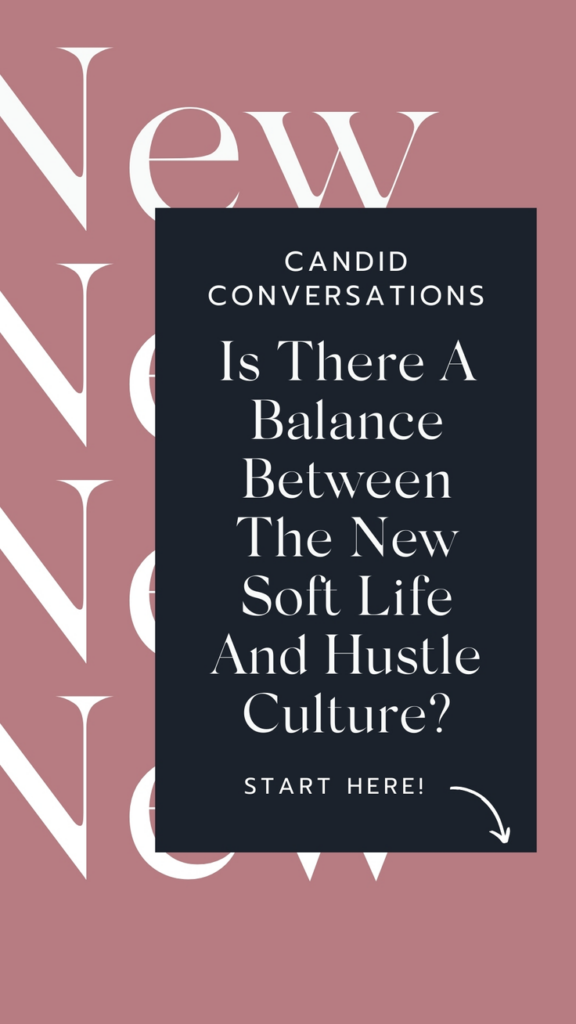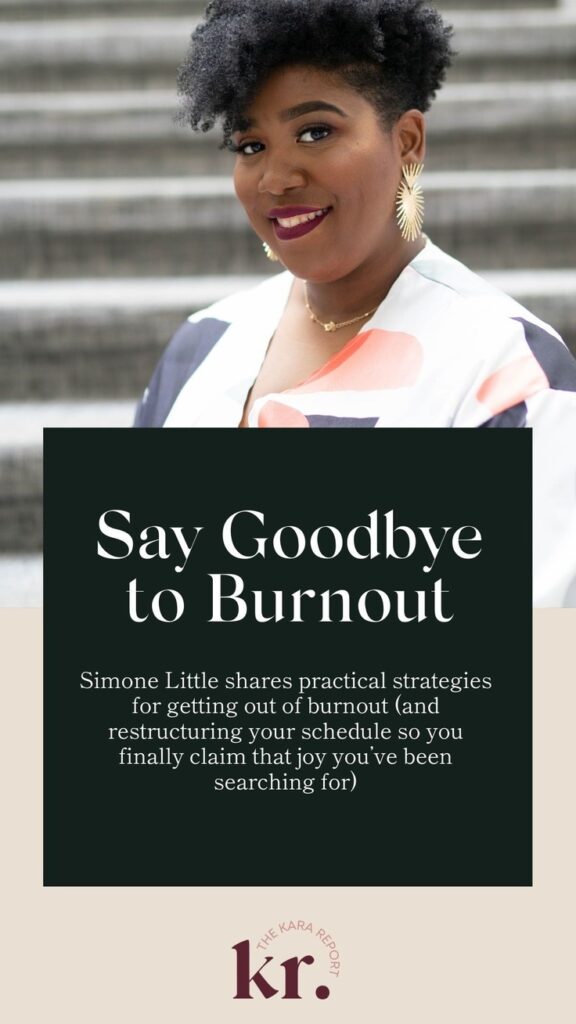Not working all the time has been a struggle for me because I genuinely love what I do (hello hustle culture). Like many entrepreneurs, I have a tendency to overcommit myself. I often don’t notice the effects until it’s almost too late and I’m way overextended. I genuinely enjoy the projects I take on and the clients I work with. However, I want to live my life too.
If this resonates with you, you’re going to love this episode. I brought on Simone to discuss why work-life balance doesn’t exist and how we can release guilt while remaining productive. We’ll explore how to get out of hustle mode while still accomplishing our goals.
To be clear, we’re not suggesting you can stop hustling, sit on your couch, and make a million dollars a year. That’s not what this podcast is about. (If I figure out how to do that, I’ll definitely pass it on!) What you’ll find in this episode are practical examples and customizable advice, which I really loved. Let’s get into it!
Listen on Apple | Listen on Spotify
Table of Contents
Who Is Simone Little?
Simone Little is a renowned lifestyle designer who has been delivering thoughtful and inspiring talks at events and conferences for women-led businesses and affluent women for over a decade. She’s dedicated herself to helping women build strong, impactful lives and businesses. Her expertise lies in examining the inner workings of life and designing personalized living strategies, which you’ll hear about in this episode.
Simone’s approach is lifestyle-first, with everything else customized to fit. She achieves this through her four Ps: Priorities, Productivity, Processes, and Planning. These four elements help her clients achieve harmony and growth. I loved our conversation, and as Simone says, her approach is ideal for people who want to scale their businesses without sacrificing their personal lives in the process.
Simone specializes in working with emotion-driven entrepreneurs who seek balance between a soft life culture and hustle culture.

You are very anti-hustle mode, but for the people still in the thick of hustle culture, how do we know if we’re hustling too hard?
Hustling is for a time, reason, or season. There has to be a cutoff. Sometimes it’s meant for a couple weeks, but next thing you know, three years later you’re still in hustle mode and that’s why you feel terrible. That’s the problem with hustle culture.
Defining parameters helps. If you find yourself heading toward hustling or feeling you’re hustling too much, or you’ve exceeded your set time period or reason, go back to the basics of defining the original goal. Depending on who you are and what you’re pursuing, it looks different. Was it a monetary goal? Something more internal? Something for your family?
Once you identify the goal, ask yourself: Am I taking on too much? How can I lighten my load at home or in business? This doesn’t always mean hiring someone. There are other ways to lighten your load. It won’t happen instantly, but how can you start slowly offloading things that keep you spinning in this hamster wheel of hustling?
How do we know if our hustling has become a problem, or we are just working all the time because we love it?
A good trigger is the people in your circle. They’ll typically tell you if you’re not fully participating in other aspects of your life. If you have honest people around you, they’ll say things like: “I never see you. When are you going to come out with me?” Or “You’re always behind your computer. I don’t get a chance to see you.” Your kids might say, “Mommy, you’re always working.” Your partner might say something like “We are so behind on our TV episodes, we just haven’t had time to watch”. They might be really sweet and subtle about it.
These comments trigger awareness that you may need to reassess things. You might love what you’re doing, but ensure there’s a harmonious balance. Are you working so much that you’re neglecting other things that require your attention and that you also love? Maybe you’ve forgotten how much you love them, doing them just enough to hate them. That’s a real phenomenon.
If we notice those nudges but can’t instantly turn off our commitments when we’ve overcommitted ourselves, what are some things we can do right away?
If you have real things you cannot take off your plate – deadlines, priorities, client demands – but you’re headed to burnout, there are steps you can take. Set markers for when you’ll get rest. Be intentional about how you use that rest time. Rest isn’t just for sleep, though you probably need it if you’re burnt out. Some rest time should be for intentional thought you haven’t had time for.
Think about:
- What new boundaries will you set in this new season after this project or set of deadlines?
- What new communication patterns will you adopt?
- Understand what’s burning you out daily. Is it client communication? The amount of work? The type of work? Maybe it’s not work at all, but life or home responsibilities.
Once you find a marker, take extra time – perhaps a Friday to Monday, not just the weekend. Use this time for intentional thought to identify burnout causes and create boundaries. These boundaries are for yourself to help you recover over time. Implement no more than two changes. Work on these for 21 to 30 days before implementing the next change or boundary. As you build on this, you’ll start feeling calmer. Anxiety and stress will release from your body. You’ll slowly emerge from burnout.
What activities do you recommend for someone who’s forgotten what they like to do for fun?
The resource I make everyone in my circle create is a micro joy list. This list is things that light you up. For those unsure what to do with new free time after setting boundaries, I encourage them to list things they enjoy. Examples: read for 15 minutes, use adult coloring books, paint your nails, bake cookies, take a walk. Create 10 of these, put them in a jar, and pull one out as a random little prize for yourself.
Can you share some tips about how we can be productive without falling into the hustle trap?
We must reframe what productivity means. Productivity gets a bad rap due to misuse over the years. It’s making steps towards your goals. Rest, play, and work all contribute to these steps. Unproductive activities take you further from your goals. You can work toward a different goal, but if it’s not aligned with your actual goals, you’re unproductive. Sleep and rest are productive.
Increasing productivity means considering what helps us make steps towards our goals. It’s not necessarily about speed, but progress. It’s about moving forward, not being stagnant.
I make schedules for people to increase productivity according to their energy, when their minds are sharpest, and when they’re not. Put tasks requiring the most brain work when you’re sharpest. Do projects needing mental stamina on your clearest days and times. As the day progresses and you’re foggier, do easy tasks that take little time.
If you’re easily distracted, plan for it. Some people, especially those discovering they have ADHD, face numerous distractions. Home life, working from home, or children can be distracting. Instead of always trying to eliminate distractions, buffer some time and add room. This helps you be more productive by reducing stress. The more stressed you are throughout your day, the less you’ll accomplish.
What are some mistakes you see entrepreneurs make with it comes to their productivity and the way we’re designing our lives?
We often stack tasks without understanding how long they take. At least quarterly, I do a time study, tracking my day to see how long tasks take. This changes based on energy levels over the past three months. Sometimes energy is high and focus is great, other times it’s not. The same applies to my clients depending on their season. We often feel we should accomplish more, not realizing how long simple tasks take.
When planning our day, we often plan projects instead of tasks, which is a mistake. For example, posting on social media is a project, not a task. It involves creating content, editing, writing captions, creating cover photos, scheduling, and more. Even sending an email might require research beforehand, making it a multi-step task.
These misconceptions lead to a pattern of hustle because we end up backed up with more to do than anticipated. We need to be more thoughtful in planning, breaking down projects into their component tasks and allocating realistic time for each.
Do you track your time all the time or do you prefer to track your time for a small period of time? What do you do with the data?
You can track your time continuously, but I find that tedious. I prefer doing it for a week or two to get the necessary data. Personally, I need to understand time spent on different clients, ensure I’m allocating enough time to my business, and track time spent in various business departments. I assess if I’m spending enough time on marketing, operations, and other projects.
I also do time estimates first to compare with actual time spent. For clients, I use the data according to their goals, which can include personal tasks like cleaning out closets, managing laundry, or redecorating. The purpose is to help figure out daily routines, understand how long tasks take, and improve scheduling.

After hustle culture, how can we stop feelings of guilt or anxiety that we might experience when we start to slow down?
That’s a good question, and it can be hard to stop hustle culture, especially for women who feel pressure to do more. Literally, count wins. It’s not just a mental exercise. Count the things you’ve done today and think about how they lead to your goal.
I decide to take a nap in the middle of the day. I might think, “I took a nap instead of getting work done,” but then I wake up refreshed. What did that help? I didn’t yell at the kids today. It’s a win because the rest of the day goes smoother. I slowed down, and took care of myself, so I’m less emotional.
It also helped because that project that was probably going to take an hour took 15 minutes because I was better rested. It actually benefited everybody. I have time to enjoy life more, so I’m genuinely happy. We discount how much happiness makes a difference in our lives, thinking only about hitting the ultimate goal. If we make enjoying life our North Star, we feel better about slowing down.
Keep a record, not necessarily a long journal. Use a Post-it note, and put it in front of you. “I accomplished this today. I accomplished a nap. I had a good conversation with a friend I hadn’t spoken to in a long time. I supported somebody else.” Whatever it is, live in that a little bit.
LINKS MENTIONED:
- Learn more about working with Simone
- Follow Simone on Instagram
- Follow Simone on Threads
- Learn more about working with our marketing agency here
- Follow me on Instagram